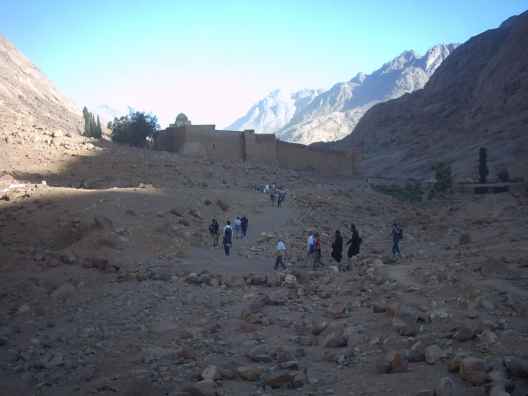 At the end of the second day at a conference in Beirut, I tried to avoid any distressing news as has been my habit for a long time if I want to sleep through the night, nightmare-free. I tried to steer clear of the story of the young hikers lost in a blizzard on St. Catherine’s Mountain in South Sinai. I couldn’t. I was bombarded by the news, until I finally logged off Facebook and went to bed. The story in brief was this: three young people had frozen to death, one was missing, and four were in critical condition. Later, the missing hiker, Mohamed Ramadan, was also found dead.
At the end of the second day at a conference in Beirut, I tried to avoid any distressing news as has been my habit for a long time if I want to sleep through the night, nightmare-free. I tried to steer clear of the story of the young hikers lost in a blizzard on St. Catherine’s Mountain in South Sinai. I couldn’t. I was bombarded by the news, until I finally logged off Facebook and went to bed. The story in brief was this: three young people had frozen to death, one was missing, and four were in critical condition. Later, the missing hiker, Mohamed Ramadan, was also found dead.
Retreating to the comfort of a warm bed in a 5-star hotel in a posh Beirut neighborhood, I thought of those young men and women’s last moments, trapped in the harsh, barren mountains. Their excitement for a new adventure, replaced by tears and painful goodbyes.
In stark contrast to these young men and women are professional media snipers. These vultures of death and mourning are experts at capturing moments of deep grief and sadness, using them to sell their worn-out products on behalf of those fighting for the seat of power. Each use different slogans to champion their cause: “We know what’s best for the country,” or “We hold the keys to heaven and hell” or “We are fighting terrorism.”
Some praise and defend the government’s rescue attempts, while others claim that if their party was still in power, the victims’ lives would have been spared. Rumors are quick to spread, some telling of an Israeli offer to assist, and others telling the story of heroic Egyptian commandos battling snowstorms and wild beasts.
They forget that there are those who are sincere, who have shared prayers and urged rescue efforts on social media. They don’t care about false stories of heroism, or praise and blame. These people haven’t lost hope in spite of their helplessness. They trumpeted efforts to help save their friends and loved ones trapped in the blizzard facing a slow death in the cold mountains.
This time, the Egyptian administration could not ignore the calls, unlike during the 2006 Al-Salam Ferry disaster. Then, authorities failed to act swiftly when a ferry carrying over 1,300 passengers sank in the Red Sea, and an inadequate rescue effort left over 1,000 dead. Local media coverage lasted only a few days before the Mubarak administration shifted focus, ignoring the disaster so as not to disturb the ‘festive mood’ in Egypt as the country celebrated holding the Africa Cup of Nations final in Cairo.
This time, an official spokesman actually commented on the tragic accident. In the past, we never saw government spokespersons, or even knew their names.
This time officials were keen to justify the slow rescue efforts. They made attempts to calm the public anger spreading on social media due to reports alleging that Egyptian authorities were not quick to dispatch a rescue plane.
This time we saw details, scrutiny and follow-up on rescue efforts. But there was no way to verify the content of the reports that emerged since the source, the over-seer and the fact-checker were all one. The free circulation of information, however, on social media gave me pause. This alternative media has a voice and a say, one which has been able to rise above the frustrating, traditional, and biased media.
This was a costly battle in a series of battles we have to win, to make the honor and dignity of Egyptians as citizens of this homeland a priority. Every Egyptian life deserves to have armies and institutions mobilize on its behalf. Even if it is being done only as a self-marketing tool to burnish the image of this administration.
It might not yet be the same for victims of political conflicts, yet I have faith in the future, iun spite of the grave losses and troubling scene before us.
We, the Egyptian people, have a say. Our voice is heard. For the first time in the history of the modern Egyptian state, successive regimes are doting on us.
Mohammad Tolba founded the Salafyo Costa Movement in April 2011. He writes a weekly column for Egyptian daily, al-Youm al-Saba’a, and his first book is to be published in the coming months, detailing his experiences in Sudan, and the challenges he has faced as an Egyptian Salafi citizen.
Image: Photo: St. Catherine's Monastery (Bouldering Monkee/Flickr)
